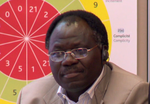Nkiko NSENGIMANA
contribution 10 -
NSENGIMANA Nkiko

tags
The planetranstlated version
Thank you very much, Mr. Chair. I would like to say something on the issue of air piracy. Apparently, all the Prosecutors have claimed that it does not fall within the jurisdiction of the ICTR. I would like to tackle it from two angles. The first angle relates to the Geneva Conventions.
You will recall that on 4 August in 1993 a peace accord was concluded under the egis of the United Nations and the African Union with the facilitation of Tanzania. That peace accord provided for a ceasefire, a lasting ceasefire. Eight months thereafter, the president of the republic, who was the only institution still functioning in the application of the peace accord, was assassinated in an act of air piracy. Together with him was the army chief of staff. And what happened after was a resumption of the war and the violation of the cease-fire embedded in the peace accord. My question is how can we claim that it does not fall under Article 4 of the Statute of the ICTR, which relates to the violation of the Geneva Conventions and additional Protocol 3, whereas, in my opinion, it is a crime against peace? For what reason whatsoever can we claim that it does not fall under the Geneva Conventions and therefore under the jurisdiction of the ICTR?
The second angle from which I view the act: How can we declare out of hand that such an important act does not fall under the mandate? I must confess that I was one of those who made the mistake of accusing the Habyarimana regime, because I could not just consider any other person who could commit such a heinous act. So I thought it was the camp of the hardliners. But other information came to light and changed my opinion. So how can we claim without any further investigation that such an important act does not fall under the mandate of the ICTR?
Because, if you say so, the same genocidaire who murdered an entire family would respond to you, and you have to believe him, that, in actual fact, he spilt blood but it was a settlement of scores in relation to some neighbourhood issue that was not related in any way to the killings that happened as were in other parts of the country. Now, if you agree to split up everything, then in the ultimate instance we cannot decide on anything concerning these acts, which was very important and which claimed millions of lives. So I can’t understand, and I would like someone to explain to me why this act should not be considered and not be related to what happened afterwards, which is the resumption of the war and the commission of large-scale crimes.
Mr. Chairman, since I still have the floor, let me round off in a minute or so, and it has to do with the investigations on the RPF. I have some information. I don’t know even half of the eighth or the quarter of what the Prosecutor knows, but I do know that in 2002, or thereabouts, when Mr. Jallow came on board, those investigations were in abeyance and that sometime after, an investigation team was reactivated. That team had three persons. If I remember correctly, that three-man team was whittled down to a two- man team, and they may have conducted two or three tiny missions.
And my question then is, with such a small team and what was subsequently done, how can we claim that investigations are underway? I suppose that there are other elements, but how can we claim that investigations are underway when I even consider that out of the two persons who make up the committee, one is soon to go on retirement? Thank you.
Andrew CLAPHAM
Thank you. We are going to close down the list of speakers. Ms. Arbia, who has been waiting for some time. I saw Leslie Haskell’s hand. Roland Amoussouga is also on my list. And Florida Mukeshimana is on the list. So then we’ll hear from the two Prosecutors and then we’ll move to the « synthèses ».
So unless somebody wants to follow particularly on this point on the events of April 6th ? Everard O’Donnell on this point? Thank you.

